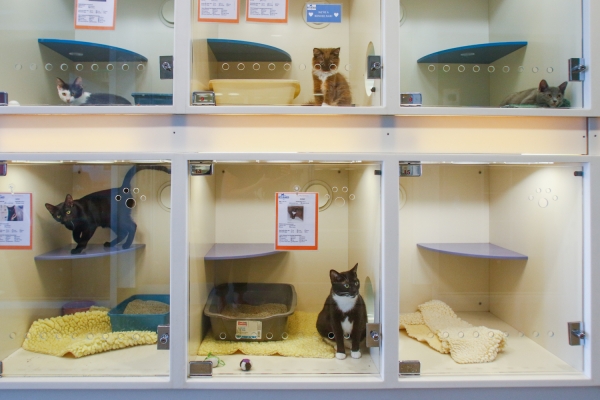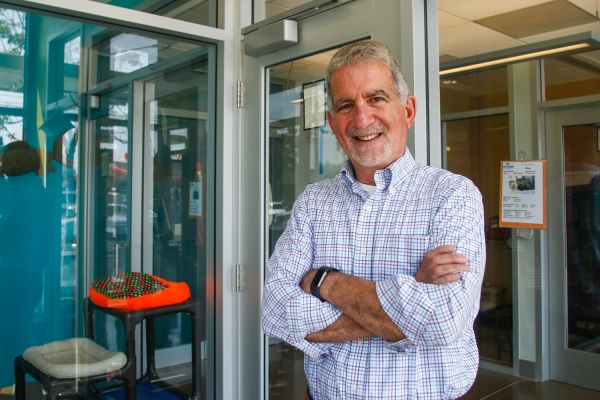When Pets In Need decided to streamline most of its operations last month because of the statewide stay-at-home order, the nonprofit animal rescue group moved quickly to empty out its kennels, sending roughly 160 animals to hunker down with foster families throughout the Midpeninsula.
Within a matter of days, it also assembled a pipeline of volunteer families ready and waiting to take in any strays that animal control officers might bring to Palo Alto's municipal no-kill shelter along East Bayshore Road. The group also operates a rescue site in Redwood City but has essentially ceased all operations there.
"The idea is to keep the shelters basically without animals, and then that way, it's easier for us to maintain (those sites) on a real small scale," Executive Director Al Mollica said. "If we had to figure out how to socialize, feed and care for all these animals in shelters, I mean, that would be a nightmare. Thankfully we have these foster (families). "
The Palo Alto shelter is operating with an on-call medical staff, one employee responsible for maintaining the kennels and another person who coordinates with volunteer foster families. All non-emergency services, such as educational and volunteer programs and on-site adoptions, are temporarily on hold, but all staff members, including hourly workers, are continuing to be paid and receive their current benefits, Mollica said.
Pets In Need isn't the only organization to clear out its kennels. Humane Society Silicon Valley, which serves Mountain View and places approximately 6,100 stray animals in homes throughout the region each year, also has worked at a record pace to house as many of its animals in foster homes as possible to make room for rescued animals from other shelters in the state that might otherwise be euthanized.
At the beginning of April, the nonprofit organization had placed 230, or about two-thirds, of its animals with foster families throughout the region and had hundreds more people waiting to take in animals, said Kurt Krukenberg, president of the nonprofit. Most operations have been suspended at the shelter.
"As you can imagine, it's been a roller coaster for us just like everyone else in the community over the past few weeks," said Krukenberg,
"We're all really trying to find a way to operate in this new normal," Krukenberg added. "We're all banding together to do what we can ... and are figuring out how to do creative new things like virtual or drive-thru adoptions."
Another strategy that Pets in Need is trying during the shutdown, when pet owners may suddenly find themselves out of work, is to help keep pets in the homes where they belong.
The nonprofit has launched a temporary financial assistance program to help owners pay for everything from pet food and medications to cat litter and emergency medical care. Pet owners can call the nonprofit and explain their situation, Mollica said. The shelter will grant individuals up to $1,000 from its $25,000 emergency fund.
"Again, this is an attempt for us to make sure we can keep animals in homes and help people that are in a financial bind right now," Mollica said. "We thought we would be focusing on people that are in lower-income areas, but what we're finding out is that just about everybody, if you've lost your job, is in dire straits."
Mollica said about 55 people have applied for financial assistance and 37 already have received assistance.
The nonprofit also is partnering with the Ecumenical Hunger Program in Palo Alto to distribute pet food and supplies to clients at home and is providing financial support and supplies to partner shelters in the Central Valley.
While the pandemic has dramatically altered animal-rescue operations throughout the region — the change hasn't necessarily been for the worse.
Mollica and Krukenberg said they have seen an unprecedented surge of volunteers opening their homes to care for cats, dogs, rabbits — and even a lizard — during these uncertain times.
Krukenberg said that, as of the beginning of this week, more than 3,000 people have expressed interest in fostering animals through the Humane Society. Mollica said the number of active foster volunteers has increased from about 430 to 780 at Pets In Need.
"This is the silver lining in a horrible situation," Mollica said. "And as nice as our shelters are, there's still no better place than being in somebody's home."
Mollica said he's thrilled that the shelter was able to place its 41 puppies in foster care for those first months that are crucial for socialization — it's an opportunity that might not have been available to every single one of the animals under normal circumstances.
Mollica said one family took in three puppies to care for while their children are stuck at home.
"They have given us a reason to get out in the yard and play every day and have provided a distraction for all of us from the anxiety-producing news," said Amie Heddle, who has been fostering dogs for Pets in Need for about a year.
"Puppies are like toddlers, and three of them are like triplet boy toddlers in the amount of energy and enthusiasm," she said.
Heddle and her family took in the pups a week before the official shutdown started.
"We knew it was best for them. ... It was the least we could do to do our part to help these poor dogs," she said.
On Wednesday, Heddle said all three puppies had been adopted, and her family is fostering a new puppy.
The nonprofit had suspended adoptions for a time but reopened them last week, and within a few days, it had already completed 16 adoptions remotely, Mollica said. Some of those who are adopting are the foster families themselves.
"What we're seeing is a number of fosters saying, 'You know, I love this guy so much. ... Just go ahead and make him a full-fledged member of the family,'" Mollica said.
Krukenberg said the Humane Society is experiencing the same phenomenon. The shelter has reopened virtual adoptions online and is looking to launch drive-thru adoptions at its Milpitas site to help move along adoption requests. On Wednesday, the shelter had already completed 20 adoptions and had received more than 200 adoption requests.
Sabrina Ashjian, state director of the Humane Society of the United States, said the number of adoptions and fosters have gone up nationwide over the past two weeks after many shelters made a public plea for help placing animals in homes during the crisis.
"We are so thrilled by the number of adoptions and fosters we've seen," she said. "We were worried that shelters might have to close if they were not deemed 'essential services.' We made the call, and so many people across the state and nation answered by clearing out shelters."
Ashjian said taking in an animal is a great source of support and companionship, especially while many people are working remotely from home and are feeling scared and socially isolated.
Ashjian said shelters are becoming very creative with virtual adoptions, curbside pickup and social-distancing guidelines.
Mollica said he believes that foster families could provide another vital link in the new virtual adoption process.
Those interested in adopting a particular animal, he explained, will be able to Skype or FaceTime with the foster family to talk about the animal's personality, likes, dislikes and other details that might not otherwise be evident if the animals were living at the shelter.
While each nonprofit has been able to adjust operations while under the shutdown, both are bracing for financial hardship that is likely to come.
The Humane Society's annual Fur Ball fundraiser at Levi's Stadium, which typically brings in about $1 million, or about 10% of the nonprofit's annual budget, had to be canceled. Krukenberg moved the organization's silent auction online at the end of March, and the four-day auction raised more than $160,000, according to a spokesperson.
Mollica said the organization is facing a difficult time ahead.
"Eighty-five percent of our money comes from fundraising and programs and adoptions," he said. "Our expenses have continued, but we have no program revenue and we haven't been able to do any serious fundraising."
The nonprofit receives the remaining 15% of its $4.3 million operating budget from the city of Palo Alto, which provides the organization $650,000 to manage its municipal shelter.
"This is a tough situation, but it's been good that we are staying active in serving the community and that so many foster families went above and beyond to help," Mollica said.
More information about adoptions or how to help is posted at PetsInNeed.org or hssv.org.
Find comprehensive coverage on the Midpeninsula's response to the new coronavirus by Palo Alto Online, the Mountain View Voice and the Almanac here.




Comments
Jackson Park
on Apr 14, 2020 at 3:56 pm
on Apr 14, 2020 at 3:56 pm
This is nice to hear that pets and caregivers are all working together. Please consider supporting the Humane Society directly.
Castro City
on Apr 14, 2020 at 6:12 pm
on Apr 14, 2020 at 6:12 pm
I agree with Dan